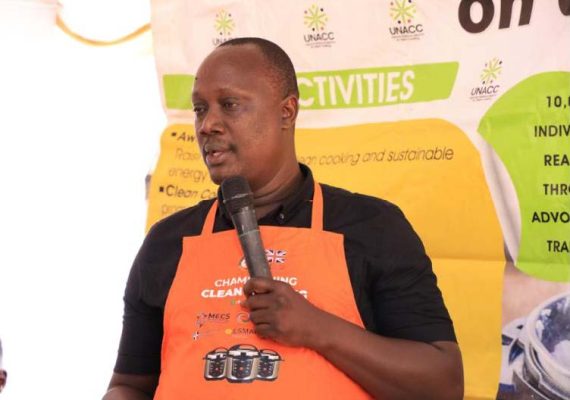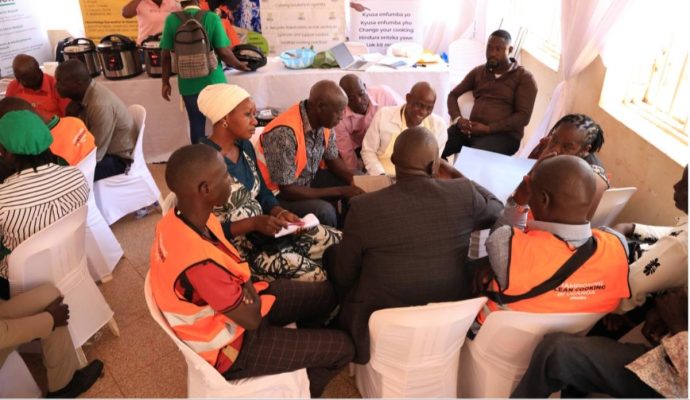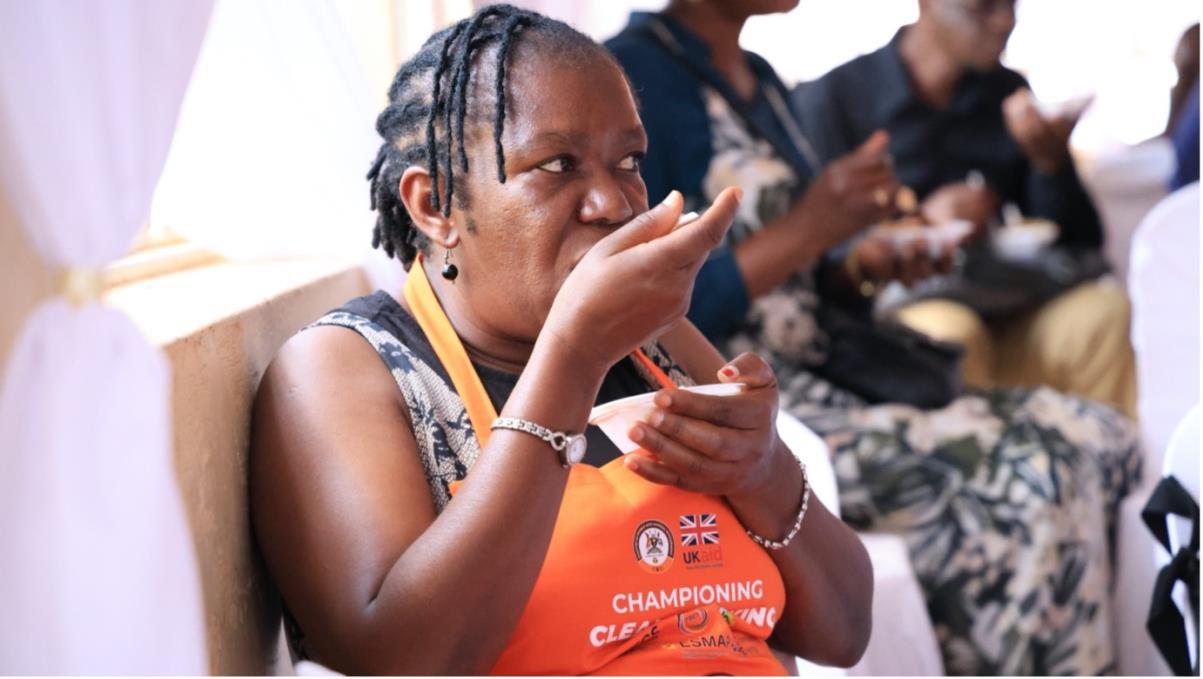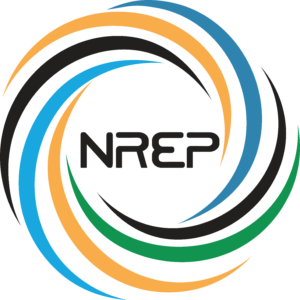In a significant step towards transforming Uganda’s cooking practices, the National Renewable Energy Platform (NREP) is implementing the Behavioral Change Campaign on Electric Cooking (BCCeC) project on behalf of the Ministry of Energy and Mineral Development (MEMD), with funding from the UK Government through the Modern Energy Cooking Services (MECS) Programme. As a key part of this nationwide effort, NREP hosted a community outreach in Iganga District on Wednesday, 3rd September 2025 at the District Headquarters. The event aimed to accelerate the adoption of modern, clean, and sustainable cooking technologies.
The event drew participation from a diverse range of stakeholders, including local government, Non-Governmental Organisations (NGOs), academia, and cultural and religious institutions.
The outreach provided a dynamic platform for dialogue, practical demonstrations, and knowledge sharing, with a strong focus on addressing barriers and promoting community-driven solutions for clean cooking.
Key Highlights and Observations
Ms. Mariah Kizza welcomed participants and acknowledged the role of local leaders and institutions in spreading awareness. She emphasized that Iganga’s outreach builds on baseline survey findings from Jinja District in 2024, which revealed a heavy reliance on traditional cooking methods. She noted that only 2% of households use electric cooking while 10% use other clean alternatives such as LPG, biogas, and ethanol, underscoring the urgent need for interventions.
Mr. Edward Balaba (Senior Environmental Officer, Iganga Town Council) reiterated support for the campaign, noting that clean cooking is a priority under Uganda’s Energy Policy. Mariah further engaged the audience on whether adopting cleaner cooking was “worth the change.” Concerns raised included the high cost of appliances, power reliability, and perceptions about food taste when cooked with electric pressure cookers (EPCs).

Key Challenges and Lessons Learned
Through Focus Group Discussions (FGDs), participants highlighted the key challenges limiting adoption and shared practical solutions to address them.
Discussions during the outreach revealed several challenges that continue to hinder the transition to clean cooking in Iganga District. The high upfront cost of technologies was noted as the most significant barrier, leaving many households unable to access modern cooking appliances. Participants also pointed out the limited awareness and rigid mindsets, where misconceptions about the taste, safety, and convenience of electric cooking remain common. In addition, the unreliability of electricity supply was highlighted as a practical challenge, particularly for households with limited or no grid connections.
In response to these barriers, participants proposed practical solutions. They called for cost reduction measures and subsidies to make appliances more affordable and recommended hire purchase models, loans, and group financing schemes to ease acquisition. Participants also emphasized the importance of consistent sensitization and awareness campaigns to dispel myths and build confidence in new technologies.
Another key proposal was the establishment of a clean cooking distribution centre in Iganga’s central market, which would bring appliances and spare parts closer to the people, ensuring both accessibility and after-sales support.
The outreach further explored the pivotal role that different institutions can play in accelerating the adoption of clean cooking solutions.
- Academic institutions were encouraged to integrate clean cooking into their curricula, promote student-led research, and involve schools in policy-making discussions. By sensitizing parents, staff, and students, and mobilizing resources to support adoption, schools can become important champions of behavioral change.
- Religious institutions were recognized as trusted voices within the community. Leaders were urged to weave environmental stewardship into their teachings, use sermons, skits, songs, and Sunday schools to spread the message, and employ crusades as platforms for live demonstrations of clean cooking.
- Cultural institutions were called upon to use their authority to sensitize communities through cultural education programs and public gatherings. By partnering with government to subsidize appliances, offering loan schemes, and reinforcing positive cultural values, these institutions can play a decisive role in shifting household cooking practices.
- Local governments were tasked with leading mass sensitization campaigns that highlight the environmental and health impacts of traditional cooking methods. They were also urged to strengthen the enforcement of environmental protection laws, while lobbying and advocating for policies that expand access to affordable clean cooking technologies at the district and national level.

Community members shared campaign slogans in both English and Lusoga to promote clean cooking:
- Cooking that saves money” – Enfumba ekekereza sente/empiya
- Cooking that preserves the environment” – Enfumba etakosa butonde bwansi
- The best way of not wasting time and money” – Engeri yonka obutamala bisera ne sente mukufumba
- Champion in Clean Cooking” – Kafulu munfumba enungi
Mr. Emmanuel Mutaka shared his household experience to illustrate the cost implications of different cooking fuels. His family of two typically cooks for about two hours each day, preparing common local meals such as rice, groundnuts, matooke, and beef.
- Charcoal Use: On average, one sack of charcoal costing UGX 70,000 lasts a month, totaling UGX 840,000 per year.
- LPG Use: A refill costs UGX 60,000 and is used about three times annually, totaling UGX 180,000 per year.
- Combined Annual Cost (Charcoal + LPG): UGX 1,020,000 (about UGX 85,000 per month).
When comparing this with an Electric Pressure Cooker (EPC) combined with LPG, the costs are significantly lower:
- Electricity (EPC): Cooking with an EPC would cost approximately UGX 30,000 per month, or UGX 360,000 per year.
- LPG: Retained at UGX 180,000 per year.
- Combined Annual Cost (EPC + LPG): UGX 540,000 (about UGX 45,000 per month).
This comparison shows that EPC + LPG is nearly 50% cheaper than the charcoal + LPG combination. Beyond the savings, it also reduces cooking time, lowers exposure to harmful smoke, and helps protect the environment.


Exhibition of clean cooking technologies.
As part of the Iganga outreach, NREP organized an exhibition in association with the Uganda National Alliance on Clean Cooking (UNACC) showcasing a variety of clean cooking technologies.
Community members were able to see and interact with electric pressure cookers, air fryers, improved biomass cookstoves, solar-aided volcanic rock stoves and other innovative appliances.
The exhibition allowed participants to ask questions, explore appliance features, and gain a practical understanding of sustainable cooking solutions, complimenting the cooking demonstrations and presentations.
Conclusion & Next Steps
The Iganga outreach reinforced the need for continuous sensitization and collaboration with key institutions. Participants recognized the cost savings, efficiency, and health benefits of clean cooking technologies, while also identifying barriers that require strategic intervention.
Through partnerships with MEMD, UKAid, MECS, UNACC, and local government, NREP will continue advancing behavioral change campaigns and working with communities to make clean cooking accessible, affordable, and sustainable.



